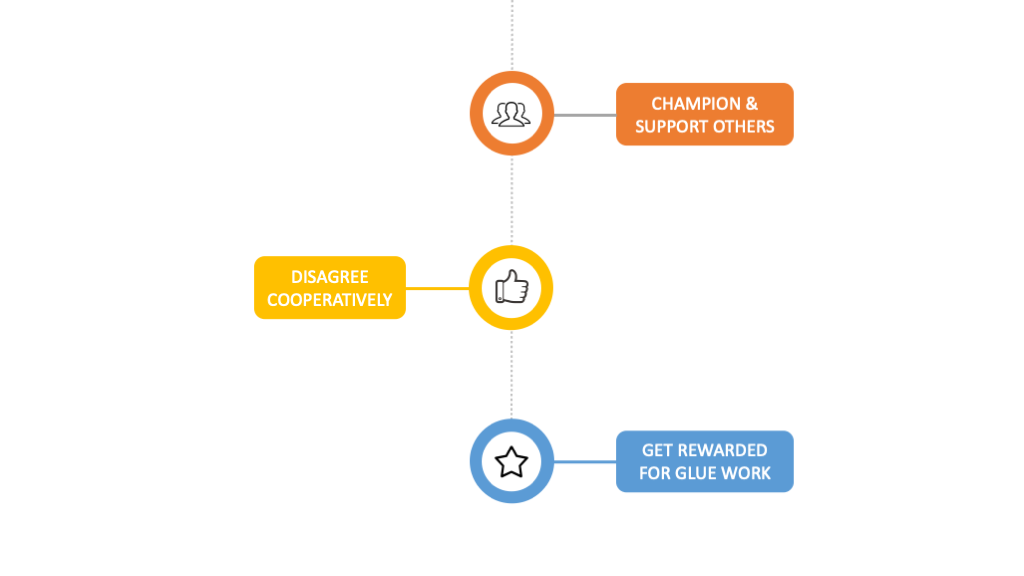Let’s Talk About Followership!
This blog post was co-written with my awesome friend, ML engineer Duana Stanley
Leadership is currently overhyped — you can’t lead if nobody is willing to follow you. Following is not trivial, as any dancer will tell you: it is a mirror art to leading. In fact, we spend most of our career following. So getting good at that matters more than getting better at leading. But outside of dancing, being a good follower is rarely taught or even appreciated.
This needs to change. Since followers do the bulk of the work, let’s acknowledge that as an equally important role. There is a misconception that following is passive and weak. On the contrary!
The book “Co-active Leadership” describes following as a type of leadership, calling strong followers “Leaders Behind”:
„In command-and-control, one-dimensional leadership, we believe that “front” is better than “behind” because we believe that the Leaders in Front have all the power and influence. This creates a sense that everyone else is powerless and therefore abdicate responsibility and follow blindly. Make no mistake: Leaders Behind have the power to make or break any endeavour.“
Strong followers lead from behind by being great teammates. They work well with their leaders-in-front, giving them the support they need to succeed. The book “How to Be a Star at Work” describes this as “active, creative and mindful support of the leader's path“.
The behaviors of strong followers are active. Strong followers
Lead themselves
Focus, commit and are motivated by more than personal gain
Build competence and credibility
Exercise their conscience
Cooperate with leaders
Support others around them
So how do we become strong followers?
We can learn how to champion and support others
We can learn how to disagree and challenge our leaders cooperatively
We can learn how to get rewarded for Glue work
Champion and support others
Championing others means empowering and calling forth the brilliance of other people. We do this by believing in them and coaching them through deep listening, powerful questions, and acknowledgment.
Imagine how much more effective leaders-in-front can be when strong followers are helping them.
„The essence of Leader Behind is service to others. They trust the character and strength of the Leader in Front and seek to evoke leadership in others. To reach for the extraordinary, we need to know that we have people championing us as Leaders Behind.“
Championing others starts with believing in them, and looking for ways to support their ideas instead of being critical by default.
„Imagine if we were to find others right first, knowing that people make mistakes and will need to make course corrections along the way. Instead of looking for flaws and doing our best to cut others down to size, what if we started by looking for the value and usefulness in what was being offered?“
When we champion others, we contribute to others' success and the success of the collective. And that can be just as, if not more rewarding than being in the spotlight.
2. disagree and challenge our leaders cooperatively
As practitioners, we have opinions on what our team should be doing. Great leaders involve their team when shaping direction. And there is a lot of material for leaders in-front on how to do that. But there is not much material on how we can actively influence as a follower.
The book “How to be a Star at Work” offers advice on how to disagree cooperatively:
Be Proactive
Assume your leader wants the best outcome (until proven otherwise)
Provide your input before the fact, when there is still time to act on it
Understand that your leader is most likely acting from different information than what you have
Be a Fact Finder
Take the time to get the facts of a situation before making a case to leaders
Start with the assumptions that your leader did not have access to the same information
Share the facts in an informal talk or memo with the leader in private first
Be an Advice Seeker
Get a second opinion from an external advisor that can see both your perspective and that of your leader
Be a System Player
Follow your company’s established norms and protocols for airing disagreements
Work out the issue in private with your leader first
If that fails, work out each step in the company’s conflict resolution process
Be Persuasive
Speak the language of your organization. Orient your position towards the values and vision dear to the organization and its leaders
Make your argument by pointing out what the proposal will do for the organization or what it will lose by not accepting it
Be Courageous and Diplomatic
Go over the head when absolutely necessary
Practice your confrontation and courage-building skills so that when a larger crisis happens, you will be prepared
Be aware that you are taking a career risk, make sure it‘s an issue that you are willing to take that risk for
Be a Collective Follower or Plan Well to Stand Alone
It is easier to make a stand of conscience when others are with you -- your voice is stronger if it blends with the voices of others
If you need to take a stand alone, plan ahead wisely to soften the blow (other job options, savings as financial cushions, …)
3. Get recognised for Glue work
Glue work, as coined by Tanya Reilly in her talk “Being Glue”, is the small invisible continuous work that holds a team together and keeps clients happy. You can think of it as uncredited team lead work. Strong followers do a lot of Glue work!Work cultures that focus on the achievements of individuals miss these important contributions. What can we do about this?
Tanya recommends collecting artifacts of your Glue work, e.g. design documents and email conversations. Tell a story of how, based on your leadership-from-behind and expertise, you made these things happen.
Doing Glue work is expected of seniors. Collecting evidence of it will help you get recognition for your contributions and might serve as a bridge into leadership roles.
If you are junior, beware that Glue work is often not expected of you at this level. It might be perceived as detracting from your delivery expectations. Have a conversation with your manager about promotion expectations to make sure that your Glue work gets recognized.
Have a document that lists your achievements including evidence of your Glue work and use this for your performance reviews. Julia Evans encourages you to do this even if your company doesn’t have a process for this. A common problem for strong followers is that we don’t have one big thing to list as an achievement. Instead, we have thousands of tiny things we do constantly that cumulatively create impact. Feel free to summarize these activities, with evidence of their impact, to highlight all the great work you are doing.
Let’s raise the status of followers!
Followership has power because leaders trust you. Strong followers are called upon by leaders to help them make things happen. They naturally earn trust from their colleagues and can use this influence without political games. The more we become aware of this power, the more we can appreciate and strengthen those skills in ourselves and our colleagues. There is a lot of untapped potential for those of us who want to expand our impact, but are not attracted to “leader in front” roles.
Unfortunately, many companies don‘t have a structure for rewarding strong followers. Some companies have Individual Contributor career paths. But they typically focus on what you have led, rather than what you have contributed to the group. We don‘t have an answer to that, but if you can, move to a workplace where you feel your work is valued.
Following is a skill and essential role. There needs to be much more discussion on growing and rewarding followership skills. We would love to hear more voices on the topic!
Thank you, Debbie, Kat, Tereza, Alice and Mark, for your feedback on this blog post! 🙏






